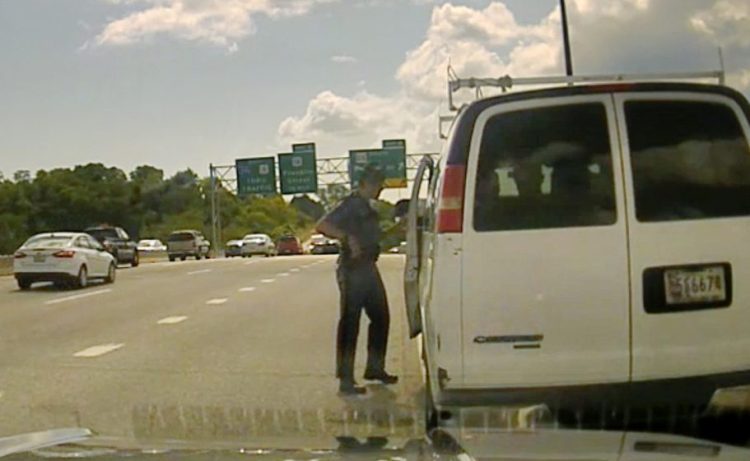A federal appeals court in Boston has ruled against a Honduran man whose attorney claimed he was the victim of racial profiling during a controversial traffic stop in Portland.
Mario Ernesto Garcia-Zavala was a passenger in a van pulled over on Interstate 295 in 2017. He was ultimately detained, charged and convicted of illegally re-entering the United States after being deported in 2014. He was 21 years old at the time of his arrest.
Maine State Trooper Robert Burke III testified in U.S. District Court in Portland last year that he stopped the van of Spanish-speaking men because it had a cracked windshield and the front passenger was not wearing a seat belt.
But defense attorney Robert Andrews argued that the trooper was more concerned about the passengers’ immigration status than the traffic violations. Andrews said that there was no probable cause for an arrest, that the traffic stop was too long because the trooper waited for immigration agents to arrive, and that Garcia-Zavala should not have been detained for nearly two weeks before his first court appearance. He asked the court to suppress evidence and dismiss the case.
A judge in Portland ruled the traffic stop and detention were legal, and Andrews took the case to the 1st Circuit Court of Appeals in Boston. During oral arguments earlier this month, the panel of three judges questioned the attorneys about probable cause and immigration records. They issued a ruling Monday that upheld the lower court’s decision.
“At oral argument, Garcia-Zavala suggested that the van’s passengers may have been racially profiled,” Judge Susan Lynch wrote in the order. “But he never developed this argument in his briefs and he offers no basis for finding clear error in the district court’s factual finding to the contrary.”
The judges decided the detention was not too long, even though suspects facing criminal charges generally have to be brought before a judge within 72 hours. They agreed with the lower court that Garcia-Zavala was subject to what immigration officials call an administrative hold, which is a civil proceeding rather than a criminal one.
They also ruled that identifying information – name, date of birth and country of origin – do not fall under information protected by a suspect’s right to remain silent.
Andrews did not respond to a request for comment Tuesday morning.
U.S. Attorney Halsey B. Frank said in a written statement that he agreed with the ruling. “We have a lawful system of immigration. We appreciate it when our state and local law enforcement partners help us identify people who cross our borders illegally, often, as here, repeatedly,” Frank said.
A police video of the traffic stop captured conversations between Burke and Trooper Jay Cooley, in which they can be heard ridiculing the passengers and referring to them as “disgusting” and “sketchy.” The video also shows Burke calling an immigration agent just minutes into the traffic stop, and Andrews played clips of that interview during the hearing in the lower court.
“This is the (expletive) ICE motha load right here,” Burke tells Cooley when he arrives as backup. “Fourteen of ’em. Not one of them speaks English. Drivers – no driver’s licenses. ICE is gonna be coming out here with their (expletive) SWAT team on this one. I just need you to watch them. They’re all (expletive) sketchy as hell.”
ICE is the acronym for U.S. Immigration and Customs Enforcement.
“Even assuming accuracy of Trooper Burke’s cracked windshield and no seat belts justification, Trooper Burke almost immediately changed his focus to the immigration status of the men,” Andrews wrote in his appeal brief. “The problem is that none of the factors relied on by Trooper Burke are permissible under our law as a basis for suspicion. Ancestry alone is not a basis (for) making a stop or investigating. Appearing Hispanic is also not a basis for reasonable suspicion.”
The prosecutor, Assistant U.S. Attorney Julia Lipez, challenged Andrews’ timeline of events and said the trooper did not violate Garcia-Zavala’s rights during or after the traffic stop. She added that Garcia-Zavala’s presence in the United States continued to be against the law.
“Even in the case of full suppression of the evidence and dismissal of the indictment, Garcia-Zavala would have been subject to re-arrest immediately upon release,” Lipez wrote in her own argument.
One of the three judges who heard the appeal arguments is from Maine – Judge William Kayatta. Justice David Souter, who is from New Hampshire, retired from the U.S. Supreme Court but still hears cases in federal court on occasion. The third was Lynch, who has spent most of her career in Massachusetts.
Garcia-Zavala would likely have been deported regardless of the outcome of the criminal trial, but fought the charge to avoid having a felony conviction. His attorney said he does not have a criminal record except for his 2014 arrest for being in the United States without permission or legal status.
Comments are not available on this story.
Send questions/comments to the editors.



